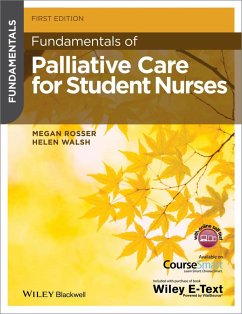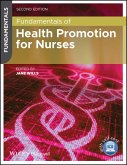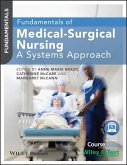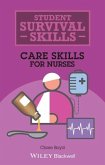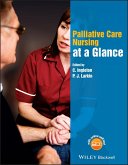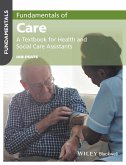- Broschiertes Buch
- Merkliste
- Auf die Merkliste
- Bewerten Bewerten
- Teilen
- Produkt teilen
- Produkterinnerung
- Produkterinnerung
Fundamentals of Palliative Care for Student Nurses is a thorough yet accessible introduction and overview of a keyarea of the nursing programme. This textbook clearly explains thepalliation of symptoms and the social context of death and dying.Engaging with the latest guidelines and curriculum, it highlightsthe practical and communicative skills required for inductionprogrammes and continuing professional development.
KEY FEATURES:
A full-colour, student-friendly, introduction to the essentialsof palliative, or end of life care A topical and timely subject area, explored clearly…mehr
Andere Kunden interessierten sich auch für
![Fundamentals of Health Promotion for Nurses Fundamentals of Health Promotion for Nurses]() Fundamentals of Health Promotion for Nurses45,99 €
Fundamentals of Health Promotion for Nurses45,99 €![Fundamentals of Medical-Surgical Nursing Fundamentals of Medical-Surgical Nursing]() Anne-Marie BradyFundamentals of Medical-Surgical Nursing55,99 €
Anne-Marie BradyFundamentals of Medical-Surgical Nursing55,99 €![Case Studies in Palliative and End-Of-Life Care Case Studies in Palliative and End-Of-Life Care]() Case Studies in Palliative and End-Of-Life Care75,99 €
Case Studies in Palliative and End-Of-Life Care75,99 €![Care Skills for Nurses Care Skills for Nurses]() Claire BoydCare Skills for Nurses19,99 €
Claire BoydCare Skills for Nurses19,99 €![Palliative Care Nursing at a Glance Palliative Care Nursing at a Glance]() Palliative Care Nursing at a Glance45,99 €
Palliative Care Nursing at a Glance45,99 €![Fundamentals of Mental Health Nursing Fundamentals of Mental Health Nursing]() Fundamentals of Mental Health Nursing47,99 €
Fundamentals of Mental Health Nursing47,99 €![Fundamentals of Care Fundamentals of Care]() Ian PeateFundamentals of Care35,99 €
Ian PeateFundamentals of Care35,99 €-
-
-
Fundamentals of Palliative Care for Student Nurses is a thorough yet accessible introduction and overview of a keyarea of the nursing programme. This textbook clearly explains thepalliation of symptoms and the social context of death and dying.Engaging with the latest guidelines and curriculum, it highlightsthe practical and communicative skills required for inductionprogrammes and continuing professional development.
KEY FEATURES:
A full-colour, student-friendly, introduction to the essentialsof palliative, or end of life care
A topical and timely subject area, explored clearly andconcisely
Full of interactive pedagogy and features, including quizzes,multiple choice questions, vignettes/case studies andactivities
Features a companion website with links to further reading,additional activities and resources, and self-testing interactivemultiple choice questions
Fundamentals of Palliative Care for Student Nurses focuses on this area with expert knowledge and compassion,preparing students in order to help them provide the best possiblecare for their patients and their families.
Hinweis: Dieser Artikel kann nur an eine deutsche Lieferadresse ausgeliefert werden.
KEY FEATURES:
A full-colour, student-friendly, introduction to the essentialsof palliative, or end of life care
A topical and timely subject area, explored clearly andconcisely
Full of interactive pedagogy and features, including quizzes,multiple choice questions, vignettes/case studies andactivities
Features a companion website with links to further reading,additional activities and resources, and self-testing interactivemultiple choice questions
Fundamentals of Palliative Care for Student Nurses focuses on this area with expert knowledge and compassion,preparing students in order to help them provide the best possiblecare for their patients and their families.
Hinweis: Dieser Artikel kann nur an eine deutsche Lieferadresse ausgeliefert werden.
Produktdetails
- Produktdetails
- Fundamentals
- Verlag: Wiley & Sons
- 1. Auflage
- Seitenzahl: 304
- Erscheinungstermin: 1. November 2014
- Englisch
- Abmessung: 246mm x 187mm x 17mm
- Gewicht: 654g
- ISBN-13: 9781118437803
- ISBN-10: 1118437802
- Artikelnr.: 40553613
- Herstellerkennzeichnung
- Libri GmbH
- Europaallee 1
- 36244 Bad Hersfeld
- gpsr@libri.de
- Fundamentals
- Verlag: Wiley & Sons
- 1. Auflage
- Seitenzahl: 304
- Erscheinungstermin: 1. November 2014
- Englisch
- Abmessung: 246mm x 187mm x 17mm
- Gewicht: 654g
- ISBN-13: 9781118437803
- ISBN-10: 1118437802
- Artikelnr.: 40553613
- Herstellerkennzeichnung
- Libri GmbH
- Europaallee 1
- 36244 Bad Hersfeld
- gpsr@libri.de
Megan Rosser is Director for CPD/Non Professional Undergraduate Programmes at Swansea University. She is an established palliative care practitioner and educationalist, with previous oncology training and experience. She is experienced in the provision of palliative nursing care in primary and secondary health care settings. Helen C. Walsh is Tutor in Nursing at Swansea University. This involves teaching and its associated activities for students on a range of levels from health care support workers, pre and post registration and Masters. The majority of her teaching relates to palliative care and its associated subjects.
About the series xi
The Authors xii
Acknowledgements xiii
Preface xiv
About the companion website xv
Section I The principles of palliative care 1
Chapter 1 The development of palliative care 3
Introduction 3
What is palliative care? 4
Where is palliative care provided? 8
Widening access 9
Influential documents and strategies 11
Conclusion 14
Chapter 2 Holistic care in palliative care 16
Introduction 16
Total pain 17
Holism 17
Holistic care 18
Spirituality 21
Quality of life 26
Conclusion 27
Chapter 3 Team working 31
Introduction 31
What is a team? 32
Why is interprofessional team work important in palliative care? 33
What makes a team work well? 41
What stops a team from working well? 44
Conclusion 46
Chapter 4 Legal principles in palliative care 48
Introduction 48
Identification of legal issues surrounding the provision of palliative care
49
Consent 50
Best interests 55
Withholding and withdrawing treatment 56
Do not resuscitate orders (DNR) 57
Euthanasia and assisted suicide 57
Verification of death 60
Conclusion 61
Chapter 5 Ethical principles in palliative care 63
Introduction 63
The meaning of ethics 64
Ethical theories 70
Euthanasia 75
Conclusion 76
Section II The practice of palliative care 79
Chapter 6 Communication in palliative care 81
Introduction 81
The importance of communication in palliative care 83
Communication theory 84
The importance of self-awareness in good communication 86
Key communication skills 87
Enablers of and barriers to good communication 91
Influencing factors 92
Communicating with groups who have particular needs 94
Conclusion 95
Chapter 7 Pain management and nursing care 98
Introduction 98
Pain 99
Pain assessment 101
Principles of pain management 106
Non-pharmacological approaches to pain relief 110
Conclusion 111
Chapter 8 Management and nursing care of gastro-intestinal symptoms 116
Introduction 116
Nausea and vomiting 117
Assessment 118
Management of nausea and vomiting 120
Nursing care 122
Malignant bowel obstruction 123
Constipation 124
Cachexia 126
Other gastrointestinal symptoms 127
Conclusion 128
Chapter 9 Management and nursing care of breathlessness and fatigue 133
Introduction 133
Breathlessness 134
Assessment of breathlessness 135
Pharmacological Management of breathlessness 135
Nursing management 137
Fatigue 138
Assessment 139
Management of fatigue 140
Nursing care 140
Conclusion 141
Chapter 10 Management and nursing care of psychological symptoms 145
Introduction 145
Psychological concerns 147
Depression and Anxiety 148
Management and treatment of anxiety and depression 153
Sexuality 154
Assessing sexuality 156
Psychological care 159
Conclusion 162
Chapter 11 Caring for the family 169
Introduction 169
Defining the family 170
Role of the family in care giving 172
Effects of caring on the family 173
The needs of carers 176
Communicating with the family 179
Conclusion 180
Chapter 12 Palliative care emergencies 184
Introduction 184
Palliative care emergencies 185
Spinal cord compression 185
Superior vena cava obstruction (SVCO) 188
Hypercalcaemia 189
Conclusion 191
Chapter 13 Nursing care at end of life 195
Introduction 195
Recognising that a patient is dying 196
End of life care 196
Physical nursing care for the dying patient 198
Bronchial secretions ('death rattle') 201
Terminal restlessness 201
The syringe driver 203
Being with a dying patient 204
Nurse's role after death 205
Conclusion 207
Chapter 14 Loss grief and bereavement 212
Introduction 212
Coping With Loss 213
Common emotional responses to loss 215
Bereavement theories 216
Helping the bereaved 219
Conclusion 223
Section III Personal and professional development in palliative care 229
Chapter 15 Looking after yourself 231
Introduction 231
What is stress and why do we need to know about it? 232
Some of the reasons nursing is stressful 236
Effects of stress 237
Coping strategies 237
Managing your stress 241
Conclusion 244
Chapter 16 Professional support 247
Introduction 247
Key people 248
Clinical supervision 250
Conclusion 258
Chapter 17 Learning from your practice through reflection 261
Introduction 261
Types of reflection 263
Why use reflective practice? 265
Starting your reflective practice 266
Conclusion 272
Index 275
The Authors xii
Acknowledgements xiii
Preface xiv
About the companion website xv
Section I The principles of palliative care 1
Chapter 1 The development of palliative care 3
Introduction 3
What is palliative care? 4
Where is palliative care provided? 8
Widening access 9
Influential documents and strategies 11
Conclusion 14
Chapter 2 Holistic care in palliative care 16
Introduction 16
Total pain 17
Holism 17
Holistic care 18
Spirituality 21
Quality of life 26
Conclusion 27
Chapter 3 Team working 31
Introduction 31
What is a team? 32
Why is interprofessional team work important in palliative care? 33
What makes a team work well? 41
What stops a team from working well? 44
Conclusion 46
Chapter 4 Legal principles in palliative care 48
Introduction 48
Identification of legal issues surrounding the provision of palliative care
49
Consent 50
Best interests 55
Withholding and withdrawing treatment 56
Do not resuscitate orders (DNR) 57
Euthanasia and assisted suicide 57
Verification of death 60
Conclusion 61
Chapter 5 Ethical principles in palliative care 63
Introduction 63
The meaning of ethics 64
Ethical theories 70
Euthanasia 75
Conclusion 76
Section II The practice of palliative care 79
Chapter 6 Communication in palliative care 81
Introduction 81
The importance of communication in palliative care 83
Communication theory 84
The importance of self-awareness in good communication 86
Key communication skills 87
Enablers of and barriers to good communication 91
Influencing factors 92
Communicating with groups who have particular needs 94
Conclusion 95
Chapter 7 Pain management and nursing care 98
Introduction 98
Pain 99
Pain assessment 101
Principles of pain management 106
Non-pharmacological approaches to pain relief 110
Conclusion 111
Chapter 8 Management and nursing care of gastro-intestinal symptoms 116
Introduction 116
Nausea and vomiting 117
Assessment 118
Management of nausea and vomiting 120
Nursing care 122
Malignant bowel obstruction 123
Constipation 124
Cachexia 126
Other gastrointestinal symptoms 127
Conclusion 128
Chapter 9 Management and nursing care of breathlessness and fatigue 133
Introduction 133
Breathlessness 134
Assessment of breathlessness 135
Pharmacological Management of breathlessness 135
Nursing management 137
Fatigue 138
Assessment 139
Management of fatigue 140
Nursing care 140
Conclusion 141
Chapter 10 Management and nursing care of psychological symptoms 145
Introduction 145
Psychological concerns 147
Depression and Anxiety 148
Management and treatment of anxiety and depression 153
Sexuality 154
Assessing sexuality 156
Psychological care 159
Conclusion 162
Chapter 11 Caring for the family 169
Introduction 169
Defining the family 170
Role of the family in care giving 172
Effects of caring on the family 173
The needs of carers 176
Communicating with the family 179
Conclusion 180
Chapter 12 Palliative care emergencies 184
Introduction 184
Palliative care emergencies 185
Spinal cord compression 185
Superior vena cava obstruction (SVCO) 188
Hypercalcaemia 189
Conclusion 191
Chapter 13 Nursing care at end of life 195
Introduction 195
Recognising that a patient is dying 196
End of life care 196
Physical nursing care for the dying patient 198
Bronchial secretions ('death rattle') 201
Terminal restlessness 201
The syringe driver 203
Being with a dying patient 204
Nurse's role after death 205
Conclusion 207
Chapter 14 Loss grief and bereavement 212
Introduction 212
Coping With Loss 213
Common emotional responses to loss 215
Bereavement theories 216
Helping the bereaved 219
Conclusion 223
Section III Personal and professional development in palliative care 229
Chapter 15 Looking after yourself 231
Introduction 231
What is stress and why do we need to know about it? 232
Some of the reasons nursing is stressful 236
Effects of stress 237
Coping strategies 237
Managing your stress 241
Conclusion 244
Chapter 16 Professional support 247
Introduction 247
Key people 248
Clinical supervision 250
Conclusion 258
Chapter 17 Learning from your practice through reflection 261
Introduction 261
Types of reflection 263
Why use reflective practice? 265
Starting your reflective practice 266
Conclusion 272
Index 275
About the series xi
The Authors xii
Acknowledgements xiii
Preface xiv
About the companion website xv
Section I The principles of palliative care 1
Chapter 1 The development of palliative care 3
Introduction 3
What is palliative care? 4
Where is palliative care provided? 8
Widening access 9
Influential documents and strategies 11
Conclusion 14
Chapter 2 Holistic care in palliative care 16
Introduction 16
Total pain 17
Holism 17
Holistic care 18
Spirituality 21
Quality of life 26
Conclusion 27
Chapter 3 Team working 31
Introduction 31
What is a team? 32
Why is interprofessional team work important in palliative care? 33
What makes a team work well? 41
What stops a team from working well? 44
Conclusion 46
Chapter 4 Legal principles in palliative care 48
Introduction 48
Identification of legal issues surrounding the provision of palliative care
49
Consent 50
Best interests 55
Withholding and withdrawing treatment 56
Do not resuscitate orders (DNR) 57
Euthanasia and assisted suicide 57
Verification of death 60
Conclusion 61
Chapter 5 Ethical principles in palliative care 63
Introduction 63
The meaning of ethics 64
Ethical theories 70
Euthanasia 75
Conclusion 76
Section II The practice of palliative care 79
Chapter 6 Communication in palliative care 81
Introduction 81
The importance of communication in palliative care 83
Communication theory 84
The importance of self-awareness in good communication 86
Key communication skills 87
Enablers of and barriers to good communication 91
Influencing factors 92
Communicating with groups who have particular needs 94
Conclusion 95
Chapter 7 Pain management and nursing care 98
Introduction 98
Pain 99
Pain assessment 101
Principles of pain management 106
Non-pharmacological approaches to pain relief 110
Conclusion 111
Chapter 8 Management and nursing care of gastro-intestinal symptoms 116
Introduction 116
Nausea and vomiting 117
Assessment 118
Management of nausea and vomiting 120
Nursing care 122
Malignant bowel obstruction 123
Constipation 124
Cachexia 126
Other gastrointestinal symptoms 127
Conclusion 128
Chapter 9 Management and nursing care of breathlessness and fatigue 133
Introduction 133
Breathlessness 134
Assessment of breathlessness 135
Pharmacological Management of breathlessness 135
Nursing management 137
Fatigue 138
Assessment 139
Management of fatigue 140
Nursing care 140
Conclusion 141
Chapter 10 Management and nursing care of psychological symptoms 145
Introduction 145
Psychological concerns 147
Depression and Anxiety 148
Management and treatment of anxiety and depression 153
Sexuality 154
Assessing sexuality 156
Psychological care 159
Conclusion 162
Chapter 11 Caring for the family 169
Introduction 169
Defining the family 170
Role of the family in care giving 172
Effects of caring on the family 173
The needs of carers 176
Communicating with the family 179
Conclusion 180
Chapter 12 Palliative care emergencies 184
Introduction 184
Palliative care emergencies 185
Spinal cord compression 185
Superior vena cava obstruction (SVCO) 188
Hypercalcaemia 189
Conclusion 191
Chapter 13 Nursing care at end of life 195
Introduction 195
Recognising that a patient is dying 196
End of life care 196
Physical nursing care for the dying patient 198
Bronchial secretions ('death rattle') 201
Terminal restlessness 201
The syringe driver 203
Being with a dying patient 204
Nurse's role after death 205
Conclusion 207
Chapter 14 Loss grief and bereavement 212
Introduction 212
Coping With Loss 213
Common emotional responses to loss 215
Bereavement theories 216
Helping the bereaved 219
Conclusion 223
Section III Personal and professional development in palliative care 229
Chapter 15 Looking after yourself 231
Introduction 231
What is stress and why do we need to know about it? 232
Some of the reasons nursing is stressful 236
Effects of stress 237
Coping strategies 237
Managing your stress 241
Conclusion 244
Chapter 16 Professional support 247
Introduction 247
Key people 248
Clinical supervision 250
Conclusion 258
Chapter 17 Learning from your practice through reflection 261
Introduction 261
Types of reflection 263
Why use reflective practice? 265
Starting your reflective practice 266
Conclusion 272
Index 275
The Authors xii
Acknowledgements xiii
Preface xiv
About the companion website xv
Section I The principles of palliative care 1
Chapter 1 The development of palliative care 3
Introduction 3
What is palliative care? 4
Where is palliative care provided? 8
Widening access 9
Influential documents and strategies 11
Conclusion 14
Chapter 2 Holistic care in palliative care 16
Introduction 16
Total pain 17
Holism 17
Holistic care 18
Spirituality 21
Quality of life 26
Conclusion 27
Chapter 3 Team working 31
Introduction 31
What is a team? 32
Why is interprofessional team work important in palliative care? 33
What makes a team work well? 41
What stops a team from working well? 44
Conclusion 46
Chapter 4 Legal principles in palliative care 48
Introduction 48
Identification of legal issues surrounding the provision of palliative care
49
Consent 50
Best interests 55
Withholding and withdrawing treatment 56
Do not resuscitate orders (DNR) 57
Euthanasia and assisted suicide 57
Verification of death 60
Conclusion 61
Chapter 5 Ethical principles in palliative care 63
Introduction 63
The meaning of ethics 64
Ethical theories 70
Euthanasia 75
Conclusion 76
Section II The practice of palliative care 79
Chapter 6 Communication in palliative care 81
Introduction 81
The importance of communication in palliative care 83
Communication theory 84
The importance of self-awareness in good communication 86
Key communication skills 87
Enablers of and barriers to good communication 91
Influencing factors 92
Communicating with groups who have particular needs 94
Conclusion 95
Chapter 7 Pain management and nursing care 98
Introduction 98
Pain 99
Pain assessment 101
Principles of pain management 106
Non-pharmacological approaches to pain relief 110
Conclusion 111
Chapter 8 Management and nursing care of gastro-intestinal symptoms 116
Introduction 116
Nausea and vomiting 117
Assessment 118
Management of nausea and vomiting 120
Nursing care 122
Malignant bowel obstruction 123
Constipation 124
Cachexia 126
Other gastrointestinal symptoms 127
Conclusion 128
Chapter 9 Management and nursing care of breathlessness and fatigue 133
Introduction 133
Breathlessness 134
Assessment of breathlessness 135
Pharmacological Management of breathlessness 135
Nursing management 137
Fatigue 138
Assessment 139
Management of fatigue 140
Nursing care 140
Conclusion 141
Chapter 10 Management and nursing care of psychological symptoms 145
Introduction 145
Psychological concerns 147
Depression and Anxiety 148
Management and treatment of anxiety and depression 153
Sexuality 154
Assessing sexuality 156
Psychological care 159
Conclusion 162
Chapter 11 Caring for the family 169
Introduction 169
Defining the family 170
Role of the family in care giving 172
Effects of caring on the family 173
The needs of carers 176
Communicating with the family 179
Conclusion 180
Chapter 12 Palliative care emergencies 184
Introduction 184
Palliative care emergencies 185
Spinal cord compression 185
Superior vena cava obstruction (SVCO) 188
Hypercalcaemia 189
Conclusion 191
Chapter 13 Nursing care at end of life 195
Introduction 195
Recognising that a patient is dying 196
End of life care 196
Physical nursing care for the dying patient 198
Bronchial secretions ('death rattle') 201
Terminal restlessness 201
The syringe driver 203
Being with a dying patient 204
Nurse's role after death 205
Conclusion 207
Chapter 14 Loss grief and bereavement 212
Introduction 212
Coping With Loss 213
Common emotional responses to loss 215
Bereavement theories 216
Helping the bereaved 219
Conclusion 223
Section III Personal and professional development in palliative care 229
Chapter 15 Looking after yourself 231
Introduction 231
What is stress and why do we need to know about it? 232
Some of the reasons nursing is stressful 236
Effects of stress 237
Coping strategies 237
Managing your stress 241
Conclusion 244
Chapter 16 Professional support 247
Introduction 247
Key people 248
Clinical supervision 250
Conclusion 258
Chapter 17 Learning from your practice through reflection 261
Introduction 261
Types of reflection 263
Why use reflective practice? 265
Starting your reflective practice 266
Conclusion 272
Index 275

